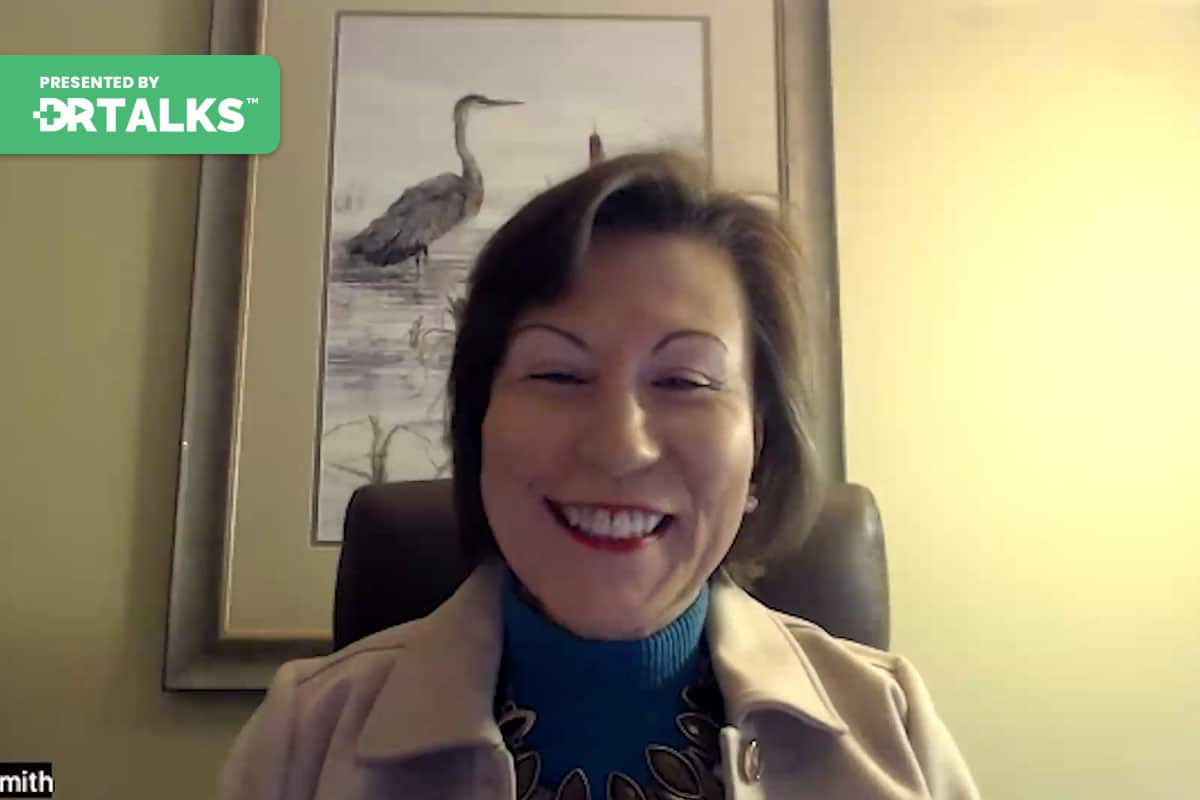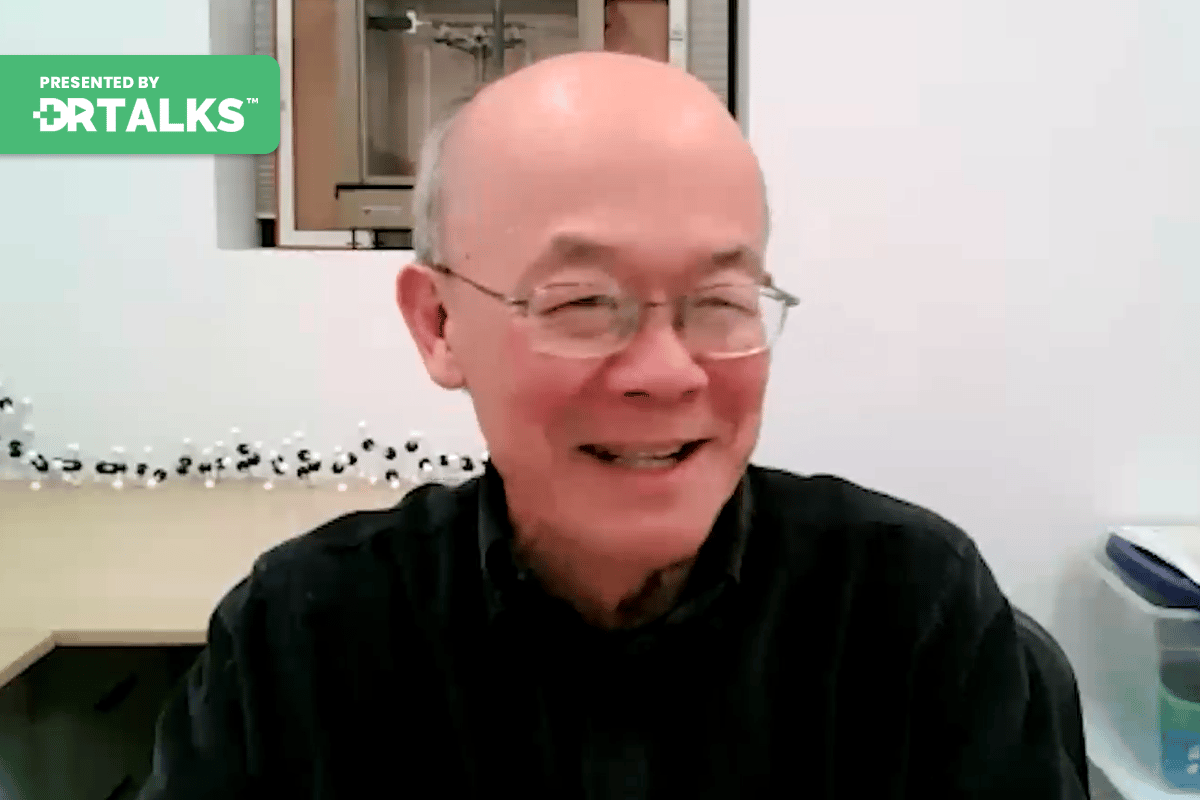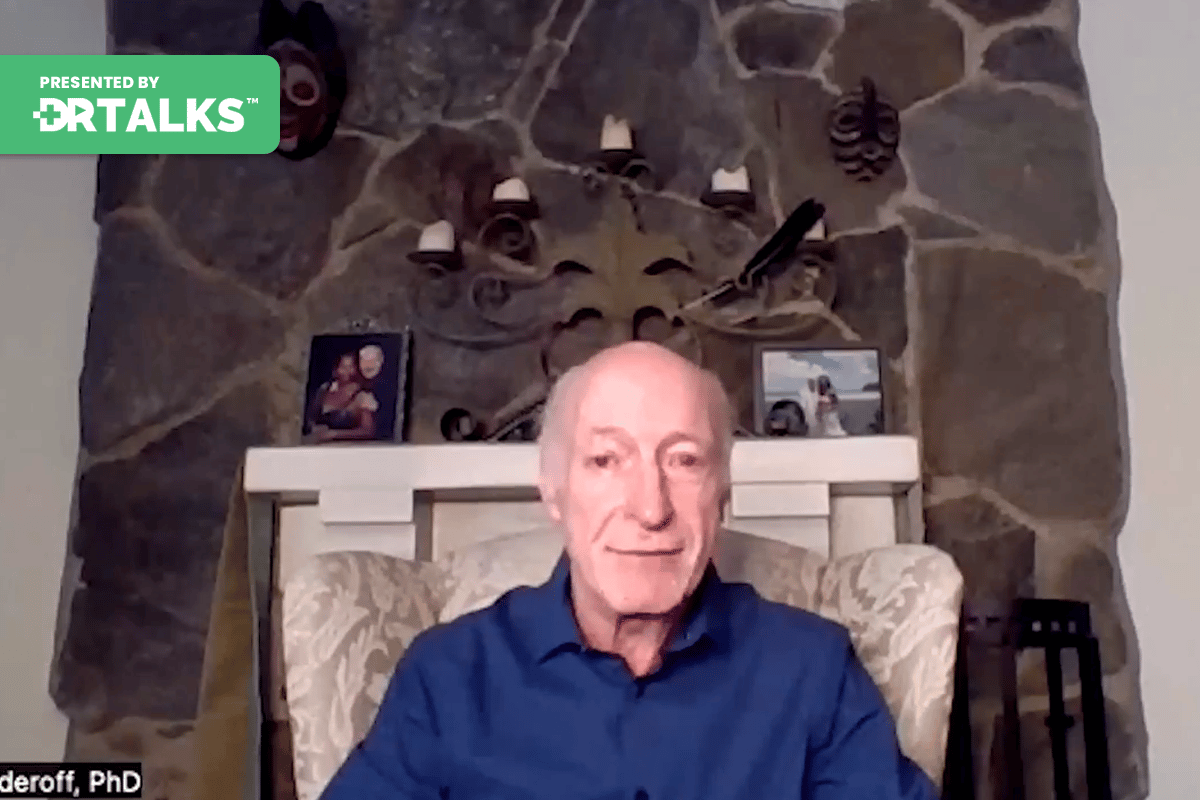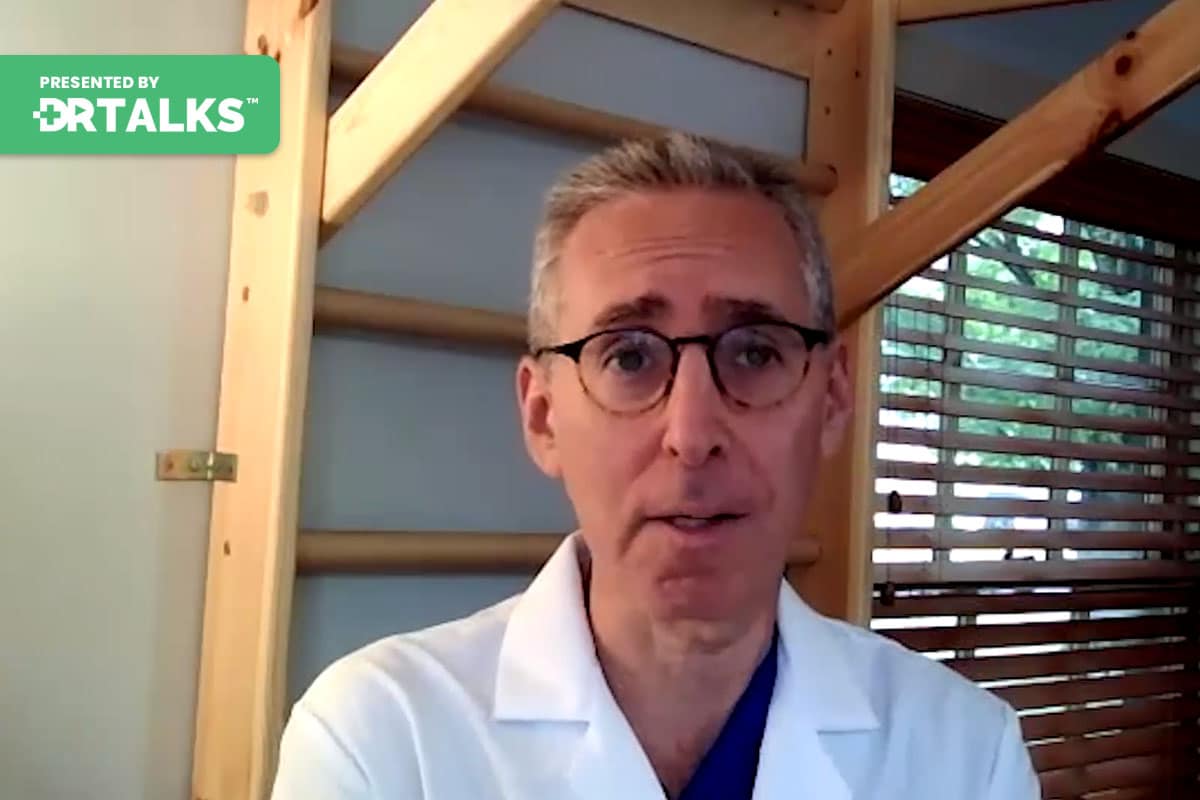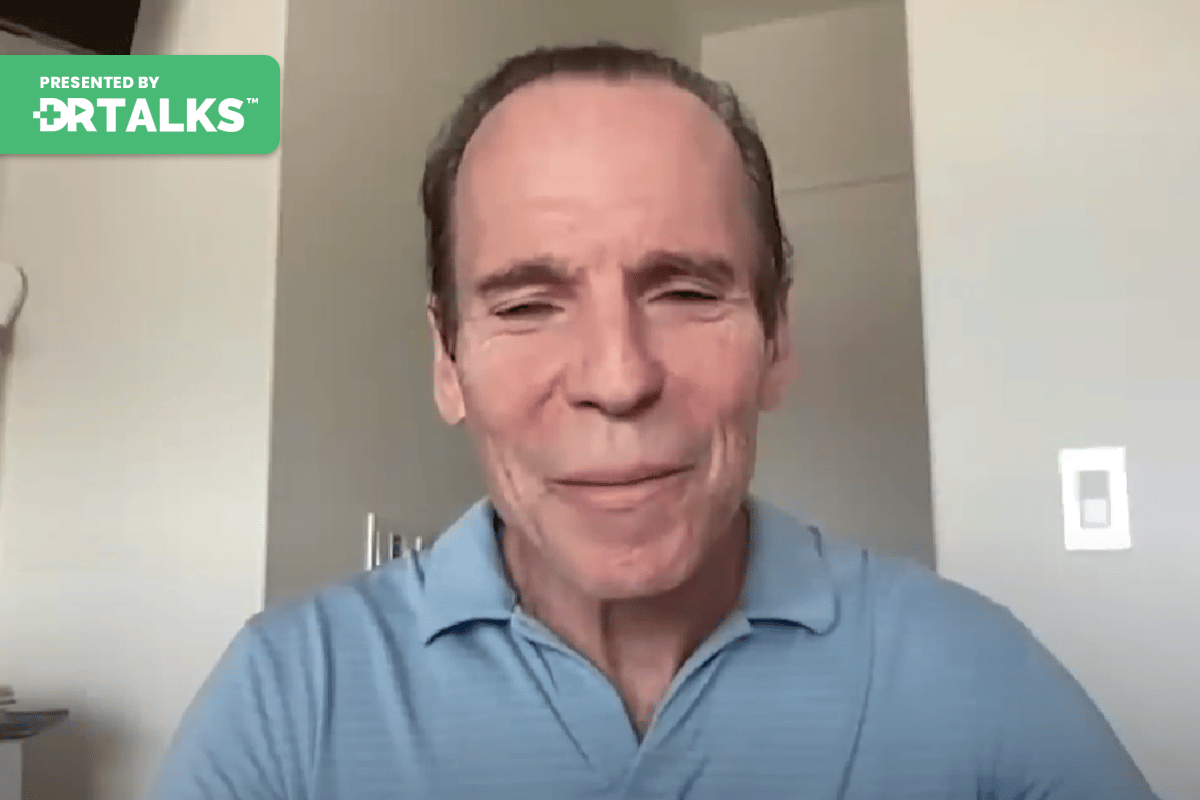Join the discussion below

Joel Kahn, MD, FACC of Detroit, Michigan, is a practicing cardiologist, and a Clinical Professor of Medicine at Wayne State University School of Medicine. He graduated Summa Cum Laude from the University of Michigan Medical School. Known as “America’s Healthy Heart Doc”. Dr. Kahn has triple board certification in Internal... Read More

Pamela Wartian Smith, MD, MPH, MS spent her first twenty years of practice as an emergency room physician with the Detroit Medical Center in a level 1 trauma center and then 28-years as an Anti-Aging/Functional Medicine specialist. She is a diplomat of the Board of the American Academy of Anti-Aging... Read More
- In women, hormones can get out of balance before and after menopause and result in increased risk of heart disease as well as poor sleep, weight gain, and a rise in cholesterol
- Saliva testing of hormones by a hormone expert (www.A4M.org) is the most accurate way to assess hormonal balance and follow therapy
- With very few exceptions like hormonally driven breast and prostate cancer, most men and women are candidates for hormone therapy using compounded hormones reassessed every 3-6 months. Pellets are not advised
Joel Kahn, MD, FACC
Everybody welcome back to Reverse Heart Disease Naturally. Summit Joel Kahn medical doctor, your host today. I’ve really exciting guest. I really worked hard to get onto her schedule because this is a professor and an educator and a clinician and a world traveler. But we’ve got Dr. Pamela Smith MD. And you probably know where you’ve seen her on public television, you’ve seen her books of which there are 11 best selling books we’re going to be talking about today, particularly the new second edition. I’m holding the book right here. What you must know about women’s hormones second edition but Dr. Pam Smith. MD, MPH, MS. I mean on a football jersey you wouldn’t be able to fit it all in, spend 20 years in Detroit is a very accomplished emergency room physician. And then to solve her own female hormone issues. She dug deep to the science and became a world expert, maybe the world expert on hormones in the anti aging functional medicine sphere. She has educated herself and she has educated me and she has educated the public with books and TVs and really she’s educated, I don’t know humbly if it’s hundreds or thousands of doctors through educational format. So I’m excited. Don’t leave. We’ve got so much information. I think my goal Dr. Smith is this is the clearest, most concise resource somebody can go to and say okay now I get it and I’ll go speak to my gynecologist, my hormone expert, my primary care doctor. Thank you so much.
Pamela Smith, MD, MPH, MS
Very happy to be here Dr. Kahn.
Joel Kahn, MD, FACC
So let’s talk. And I want you know there’s people listening are clinicians and there are just people and I think we’ll be talking to men and women probably a bit more to women right now. This interview this is a heart summit how a man slowly fades their hormone levels down with age. Unless there’s an illness, but a woman crashes or hormones down during surgical and natural menopause, why might it be good for arteries throughout the body? Whether they’re to the heart of the brain, What is it about the sex hormones that theoretically are good for extending the healthy arteries?
Pamela Smith, MD, MPH, MS
But there’s actually two issue. The first one is women really commonly do not crash their hormones, they actually become out of balance, meaning that usually progesterone leaves first, it does not balance. Therefore with estrogen, if they stay what we call estrogen dominant, then they do have an increased risk in breast cancer and many other diseases as well. So the first issue is balance. The second is really looking at the function of estrogen. Estrogen has 400 functions in the body And for some reason doctors and really just what people think they think that estrogen is evil. It is not, it really is 400 functions.
So, from the viewpoint of symptoms, its taste touch smell, hearing skin tone, it also lowers cholesterol blood sugar, blood pressure and it is the patient’s memory. There are now so many studies showing that estrogen literally helps prevent heart disease. It’s fabulous because women have estrogen receptors everywhere in their body. They have them on the heart, they have them on the eyes, they have them in the colon, not just the obvious locations. So estrogen does have all those functions. So do we replace estrogen? We absolutely do love to talk, talk about that, but it does have to balance with progesterone. We never give estrogen replacement without giving progesterone, even if a woman has had a hysterectomy.
Joel Kahn, MD, FACC
So, I mean, that was absolutely beautiful and just give me two more minutes on blood vessels themselves and the impact of balanced hormones as much of your lifespan as you can on promoting healthy blood vessels
Pamela Smith, MD, MPH, MS
When it comes to healthy blood vessels as we age, we end up with plaque NG. Which everybody knows. And so that’s the reason why some of the people have heart diseases. We get constriction of the vessels and plaque. Ng estrogen actually reverses plaque NG. There’s really nothing else that will reverse plaque. Ng, that’s already there, except for pomegranate juice. So I do have my patients drink 2-4 oz of pomegranate juice every day, as do I. I mean, I’m 68, I have a personal family history of heart disease. My dad had his first heart attack a week before, he was 45. I do have a high homocysteine, which is a risk factor for heart disease as well. I have high triglycerides. So is it important to mitigate those factors? It is. But estrogen actually helps lower blood pressure, lowers the cholesterol lowers triglycerides, reverses the plaque. Ng it acts raises HDL the good cholesterol. It has all of those beneficial effects. In fact, one study showed that giving the patient estrogen appropriately meaning bio identical, the natural form compounded. It literally helped prevent heart disease by 40 to 50%.
Joel Kahn, MD, FACC
That’s such a stunning statement. I hope everybody just heard what Dr. Smith said if you’re gonna reverse or I always think the real goal is prevent heart disease naturally. The focus of this large summit, you’ve got to listen to balance norman expert Dr. Pam Smith. So I want to go on a time travel real quick because I think the history of all this is so fascinating and you know it better now. But where in the mid nineties now and the FDA came out with an advisory statement in 1991 that hormone replacement therapy and a woman could reduce cardiovascular disease. Just what you said 1991. They said that and in 1995 I see this patient every day. But I we’re in a time capsule and you know, it’s a woman two years after her last period, she’s sleeping with some disruption. She’s gained a little weight. Like you said, her cholesterol has crept up 30-40 mg per desk leader? She’s got some hot flashes? They’re not destroying her life. What would a typical gynecologist were talking before 2001 primary care doc internist, let alone a hormone specialist. How reticent or or open mine Would they be about some form of hormone replacement balancing in the 1990s?
Pamela Smith, MD, MPH, MS
A lot of physicians would not even consider it because they really honestly don’t understand the balance of hormones. If they did consider hormone replacement, it would be short term for symptoms only, not prevention of disease and for the estrogen component they would give Premarin and most of the doctors would not even consider giving progesterone for balance.
Joel Kahn, MD, FACC
Okay, so we weren’t really at a state of the art in my time capsule, even though we had some medical societies, including cardiovascular medical societies being kind of open minded about some form of hormone balancing. And then let’s zoom to 2001 and everything just blows up like Vesuvius, tell us about, you know, real quick. The women’s heart initiative in the hers study and what was reported to the pa public and then we can talk about Monday morning quarterback analysis if the media was right on it. But what were the scientific studies, What they say?
Pamela Smith, MD, MPH, MS
Well, they basically just to sum it up really suggested that we don’t give estrogen at all to women. It’s just that simple. They really thought that they were risk factors that it did not help prevent heart disease. There were risk factors that increase the women’s risk of heart disease, which is honestly not what the science showed, but that’s what the study read
Joel Kahn, MD, FACC
All over the media and like instantly it’s rare actually to see a whole sector of the pharmaceutical industry get bashed and crash. I mean we always think that they completely control the dialogue into a large degree. They do. But here’s an instance where an industry really contracted. So in 2002, if the example patient went to a gynecologist, she’d probably here, as you just said, estrogen is dangerous and here’s some black cohosh or here’s some soy or something you can use naturally. But there’s no drugs involved. But average age of the woman’s heart initiative and enrollment was a 67 year old woman. Average age in her study was a 63 year old woman. I was telling you about a woman in her early fifties a couple of years after her last period. So as we’ve learned, I think we’ve discovered something called the Timing hypothesis. Tell us a little bit, you know, with your experienced senior view. Looking back, well, where do we miss it in the media? And what group does qualify even with the data from the W. H. I. And her study to confidently say this is an option.
Pamela Smith, MD, MPH, MS
Well, 30 years ago next week, the anti aging medicine specialty actually started. And anti aging medicine was started to look at hormone replacement because they were viewing the science and not just looking at what public opinion should be or any other focus. So 30 years ago it literally started. I was very fortunate to go to the very first anti-aging conference and I was invited by my friend in the er Dr. Cynthia Shelby Lane. Honestly I loved being an er doctor in A Level one trauma center in Detroit. I got to work for Dr. Ron Krome, the person who started emergency medicine. It was started in Detroit but I couldn’t sleep and I went to 11 doctors 11. They all told me the same thing. Take a sleeping pill. I am so glad I did not listen.
And I went to the first anti-aging conference because there I was second seminar, second slide women without progesterone frequently have insomnia. So I did the first saliva test in the Midwest and hormones by the way should be measured by salivary testing meaning saliva. I did the first test in the Midwest I found out that I had no progesterone at all, fortunately at the end of my block was my pharmacist was a compounding pharmacy and I went down and said Gary, How much progesterone do I take? I don’t have any look at how estrogen dominant I am and I have two family histories. I have heart disease and a major risk and breast cancer. I have breast cancer on both sides of my family. So people said oh my gosh you shouldn’t take hormones. Well why did I have a high risk? Because my progesterone was low, I was very estrogen dominant. So I started taking progesterone within four days, slept like a baby and have for the last 30 years. And then over time I’m now 68 I did go through menopause and I started needing estrogen.
Am I afraid to use it? No, because it actually helps lower my blood pressure. It helps lower my homocysteine. And I do take a special B vitamin for my high homocysteine, a risk factor. It really helps prevent disease, reverse the plaque. Ng So am I worried about having a heart attack? Honestly, No, am I probably going to die of heart disease because of my family history? Probably soldier. But the whole idea is that you live to be a healthy 100 years of age, I probably have a heart attack done and hopefully just pass away without having to lay around Being ill. But what is the key to health? People say, Oh, you don’t look 68. It really has to do with hormones. So how long should people take hormones? Actually forever.
There is a study showing that you have more heart protection and brain protection. If a woman starts estrogen when she loses it. So it is important to start it right away. However, that does not mean I would not start a woman on hormones at the age of 80. If she was a candidate for hormones, she would still get some brain and heart protection plus not all women lose estrogen at menopause, thinner women do because estrogen is stored in fat cells. But if the patient’s really thin they lose estrogen at menopause. My best friend Passed away at 72. She still had plenty of estrogen because she weighed 300 lb. And that was part of the problem with the study that was done and we made women afraid of estrogen. We need to know when does the woman lose estrogen and replace it at that time? Not just everybody at menopause.
Joel Kahn, MD, FACC
Just so much. You just unpack there and I’ll give a testimonial because my mother, my dear mother is your patient. We’re celebrating her 90th birthday this weekend in fact, and she’s been on hormones with you for years. And anybody out there if you need like a computer specialist or you want your Apple watch analyzed. My 90 year old mother has the cognitive capacity of a 30 year old and I give credit to the perfect hormone balancing you’ve done of female hormones and her thyroid too. So thank you for that. So and we’ll talk about the 80 year old maybe after.
But let me go back to my sample patient and I see this every week and you may not because the people that come to you obviously have pre selected you. People that come to me don’t know my stance on hormone replacement therapy, but in early fifties woman 2 to 3 years since your last menstrual period. You know not as bad off as you for sleep. I’m gonna throw in a little twister the cluster climbing and she’s inherited a cholesterol called lipoprotein A that often drops with hormone replacement therapy a little more incentive. But she comes to me and said no way. My gynecologist will not even talk to me about it because I’m not that symptomatic and I’ve sort of past that for 6 12 months. You would of course tell us what you go through. I think you already mentioned you were going to check her hormones by. So saliva not necessarily by blood. Most doctors are using blood. I know you know the research that saliva is more accurate. That’s what you’re going to do. Step one after a complete history and conversation.
Pamela Smith, MD, MPH, MS
I’m going to look at complete thyroid studies and pregnant alone. The hormone of memory by blood. And then we will look at estrogen progesterone, testosterone DHT. A. And the stress hormone cortisol by saliva. And we bring the patient back in and we literally personalize and customize their care for each and every patient. So when we look at the saliva test we do measure all three estrogens. There are three E one E. Two and E three E one. We do not replace because it’s linked to breast cancer. E two is the 400 functions and a lot of people do not know that E three literally helps prevent breast cancer. So when we replace estrogen it’s E. Two and E. Three. Is this their new studies?
When did we find out about E. Three? Actually the first article came out in Jama 98 years ago. So we have known for 98 years that there is an estrogen that literally helps prevent breast cancer. So we give E. Two two and E. Three so that the patient has a prescribed appropriately. But the other key is that the estrogen does have to be on the skin. If you give estrogen by mouth then it can drive up your blood pressure. It causes inflammation and really heart disease is all about inflammation. That’s how a statin drug works. Is it decreases inflammation. So we give it by on the skin estrogen by mouth lowers growth hormone. The hormone that keeps you young and it can cause gallstones. We always give estrogen on the skin. And that’s one thing they did not look at in the trial that you talked about. All of that estrogen was Premarin which was estrogen by mouth. It was also E one and E two. Honestly not the best selection of estrogens.
Joel Kahn, MD, FACC
Alright so this patient comes back reviews results with you our telemedicine. You’re incredible partners and has to go to a special pharmacy. Not everybody has been and is even aware that there are special pharmacies. Not the big national change a compound pharmacy but they exist in every medium in large town, that’s your experience or I’m sure there’s compound pharmacies will ship the patient’s right.
Pamela Smith, MD, MPH, MS
Absolutely. We want to make sure that the compounding pharmacist is also trained in hormone replacement. So we usually use currencies that are PCC A pharmacies because it does matter if the hormones are a good quality. It does matter the base the hormone is put in. I usually put my hormones inverse base V. E. R. S. A base because it helps the absorption of the hormones. If you cannot get testosterone into the skin then we use a special base for testosterone. But the rest go inverse base. There are pharmacies everywhere that Are specially trained in this field worldwide, not just in the United States and most of them do mail.
Some actually mail to all 50 states, some mail to all the provinces in Canada. I literally speak internationally on the subject. I was blessed in 2019 to speak on all four continents. This is a situation that the entire world needs to know about. If there’s two things that I could salah In my 44 years of practice that really changed medicine. It was bio identical hormones and low dose naltrexone which is also compounded to reduce inflammation. And as you pointed out that lipoprotein a is very pesky one of the great things to lower it is estrogen but again it has to balance with progesterone.
Joel Kahn, MD, FACC
Again so much there. Now, the same patient were walking through the experience with you. She’s taking progesterone. She’s putting on a cream that might contain E two, E three, maybe some testosterone. Are you going to say Sayonara? See in a year or how soon are you going to retest her and then readjust if needed?
Pamela Smith, MD, MPH, MS
We see the patient, we retest in 90 days and every six months thereafter because there are changes that occur. It is all about hormonal balance. So when we look at cortisol, the stress hormone, it has a major impact. We look at that by salivary testing to if the patients really stressed or actually if they gain or lose £20 they also need an adjustment and hormonal balance. So every six months after the 1st 90 days.
Joel Kahn, MD, FACC
Okay, and that’s salivary testing. I know my 90 year old mother has become very good at filling to saliva. We talk about it in the morning that she’s doing it. So and again, this 53, 54, 55, 56 year old woman might engage and continue on that. If it’s for cardiovascular prevention, why would you stop that? At age 68 or 71? She potentially is going to be on that for decades.
Pamela Smith, MD, MPH, MS
Absolutely. I raised my patients that they always ask me, When do you stop hormones. Doctors that you and I train asked the same question. My response is I’m going in when they put me in the grave, my bio identical hormones will be with me because I literally believe that.
Joel Kahn, MD, FACC
All right, Have you ever had, I remember you were an emergency room doc a famous case I saw as a resident of a woman who gave her husband a backrub by accident with his nitroglycerin ointment rather than Ben gay. And of course he blacked out. There. There are women that their skin has a appointment on that’s rich in estrogen. Have you ever seen it transferred to their spouse by intimacy? Soon after application. Is there instruction there you give?
Pamela Smith, MD, MPH, MS
There’s such a great question. First of all, estrogen has to be placed on an area of fat cells. So no matter what, the woman ways that is the thigh, you have to rub in for two minutes and rotate sites. So we do give directions, but transference can occur to their spouse that can occur to their Children, grand Children, even cats and dogs for up to 12 hours. So we always let people know that you know, do not let people near you for 12 hours, cats or dogs to sit on your lap. The other thing that occurs is showering etc. You really should not shower for about four hours after you apply it so that you get good absorption.
Joel Kahn, MD, FACC
Fantastic. Maybe just a minute or two. Who? Absolutely. Well, first of all, I mean you’re not everywhere and you can’t see everybody even though you have incredible energy. You know, how does one find somebody’s listening right now in Cheyenne Wyoming or Dubuque or Sarasota Florida or somewhere. I mean what’s the best way to pre screen? You know, it could be a gynecologist, could be an internist, could be a hormones business. Where do you find one like you, let’s just stick to the United States right now.
Pamela Smith, MD, MPH, MS
First of all, they’re always welcome to email me. You can email me at [email protected] That’s [email protected] You can also get on the website of the American Academy of anti aging physicians, make sure the patient is, make sure the doctor is fellowship trained. The other thing I’d like to comment
Joel Kahn, MD, FACC
And that is that when I wrote you, but is that a four M dot org?
Pamela Smith, MD, MPH, MS
It is a four M dot org.
Joel Kahn, MD, FACC
Okay. And there’s a find a physician button,
Pamela Smith, MD, MPH, MS
There is a fine physician, you just click and it will pop up and it will give it by different states, provinces and countries. If you can’t find and again, happy to contact me. The other thing is, it’s important to mention testosterone. There’s this big craze right now with testosterone that all women need testosterone and actually that is not the science because if you give testosterone to a woman who does not need it? It drives up her blood sugar and it increases her risk of having a heart attack. So it’s important to measure one half of women never lose testosterone in their life. I have testosterone at 68, it’s dead center of normal on that saliva test, so I’m never going to lose it. Nor is one half of women.
So those one half never need testosterone. Other remaining one half, one half or 1/4 of women actually end up at menopause with high testosterone. So we have to lower it. The remaining 1/4 have low testosterone and we give them testosterone on the skin. So it’s very important to please see a doctor who is trained in this field that does salivary testing. If your prescriber does not do salivary testing, they are not trained in this field appropriately. There’s a lot of doctors out there that say that they are specialists and they’re not and they give testosterone to everybody. And again, because we’re talking about heart disease, you give testosterone to women who don’t need it. It does increase the risk of having an acute M. I. Which is a heart attack.
Joel Kahn, MD, FACC
Okay, we don’t want to, we want to prevent them. We don’t want to trigger them. And clearly if anybody’s listening, you’re not a fan from what you just said of testosterone pellets being put into the glue talks of a woman.
Pamela Smith, MD, MPH, MS
I’m really not and that’s for several reasons. And thank you Dr. Kahn for asking me that question because it may be the most important question asked today, when you put a pellet in someone number one, you do have to make sure that it’s sterile. Most doctors that put in pellets, they’re not sterile. The doctor unfortunately has been led to believe that when you autoclave a pellet, it’s sterile, it’s actually not. We never want to put a sterile or non sterile substance into someone because it can cause an abscess, meaning the patient could get an infection. You do get a scar when you put in a pellet, you get fibrosis. So the skin gets really thick on your behind side. Also, if the dose is wrong, you can’t take it back. If the dose is wrong, we put testosterone on the skin, then there’s no problem. We can just stop it for a few days, etcetera. There’s really no reason to do a pellet. There’s no patient. We cannot get testosterone in by applying it on the skin. That special base I was talking about earlier for testosterone is called a tree Vous. A T R E. V. I. S is made for testosterone. So, an important aspect when we look at pellet therapy, honestly, not a reason to do it. We can get hormones in anyone who needs it and that includes men as well.
Joel Kahn, MD, FACC
All right. And let’s turn to the negative side. Give me the top 3 to 5 patient. Female profiles that aren’t candidates for what we’ve just talked about for the past 25 minutes. Absolutely. You know, you would say not appropriate for you.
Pamela Smith, MD, MPH, MS
A woman who’s had a hormonally related breast cancer before 20 years. The studies now show that if she’s had no reoccurrence for 20 years, that we do give natural hormonal therapy because of 20 years, the risk of heart disease getting it and the risk of cognitive dick decline outweigh the risk of her getting a reoccurrence of cancer. So, a woman who has had a hormonally related cancer. The second is untreated sleep apnea. We if you have sleep apnea that does need to be treated. First, a lot of people ask about blood clots, is that a counter indication? Actually it’s not.
And the hormones are put on the skin. There’s three clinical trials showing that if you had a blood clot or a pulmonary embolus or you have factor five leiden, which is a disease of clotting. Can you use estrogen on the skin? You can you just want to use the right dose? Of course, we never guarantee any patient that they wouldn’t get a clot. But is there an increase in clotting? If estrogen is applied to the skin at the right dose, there is not. So that’s kind of a misnomer. So honestly, the two major counter indications are hormonally related breast cancer before 20 years. Number two. Untreated sleep apnea
Joel Kahn, MD, FACC
And treated sleep apnea is not a problem if it’s correctly. Okay. And there’s a shocking, you know, Large United States study recently that 47% of unsolicited Americans. Unfortunately, unsolicited Americans are 75% overweight or obese, 47% had moderate or severe sleep apnea on home testing. And you know, when you it’s just phenomenally concerning what that does for their health in general, their brain health. And now we have a potentially large population that needs to be tested and needs to be treated. But that’s for another conversation. So in the last couple of minutes, the newest book from Dr. Pamela Smith, maximize your male hormones. We can’t go through the entire process. Of course, a lot of it would be similar but make your best plea reverse your heart disease naturally Summit. Why testosterone? Maybe a cardiovascular friendly hormone and why a man might want to see a for m dot org. Board certified hormone specialist and consider that for the cardiovascular health.
Pamela Smith, MD, MPH, MS
Well, number one, if you help her and she feels great and sexually interested that we need to help him. Number two, my book does come out today that actually is released today, maximize your male hormones. Congratulations. Thank you. It is important to look at hormones for men just as important as it is for women because as you suggested, testosterone for men, really, it has many functions. Of course it’s sexual interest is that important. Absolutely. But it also lowers cholesterol blood sugar, blood pressure. It helps with prevention of heart disease. Even treatment of heart disease, it is definitely cognition, it’s muscle mass. It’s energy. It’s all of those things for men. So again, we don’t give men testosterone if they have sleep apnea, that’s untreated. Prostate cancer is a separate suction subject. We can discuss at another time, depending on the age of the patient et cetera. But is it important for men who are andropause a well meaning menopause and men should they have hormone replacement? Absolutely, positively.
Joel Kahn, MD, FACC
Fantastic and I don’t know. I don’t want to keep bringing up lipoprotein a genetic cholesterol inheritance though 25% of everybody listening right now likely has that even if you’ve never been tested, I’ve not found good data that in men women get the advantage here that proper hormone replacement therapy may lower that cholesterol factor. I’ve not seen good data in men. It’s not a reason not to do it for all the other cardiovascular and sexual support and cognitive reasons. But are you aware of any er protein And men you know,
Pamela Smith, MD, MPH, MS
No there’s not and I honestly haven’t seen it change lipoprotein a in a male when we give hormone replacement. But I can tell you there’s no negative effect on lipoprotein a
Joel Kahn, MD, FACC
Well we’ve got all kinds of new therapies for lipoprotein. A but we just won’t consider testosterone replacement therapy and same thing. I would imagine your vast experiences. Men who do move forward on testosterone therapy should avoid pellet therapy for all the same reasons.
Pamela Smith, MD, MPH, MS
Absolutely. Again, not a reason. We can just put it in most of my males that we give testosterone to, we do put it on the skin and we use the retrieve a space. We used to give more secure. I am test past Arone early on. But the trouble with doing that meaning inter muscularly or subcutaneous lee is that you get highs and lows. First of all, we gave testosterone years ago, twice a month I am then we started giving smaller doses sub Q twice a week. But if you give it twice a week, the first day the dose is usually too high the next day it’s perfect the third day it’s too low. And so we have actually transitioned to putting it on the skin. It gives perfect absorption because men have a different experience hormonally than women. They make. They, their testosterone changes 4 to 6 times a day every single day and when we put it on the skin it more mimics physiologically how the body has always worked in males.
Joel Kahn, MD, FACC
I think actually towards a goal of providing a concise factual and exciting overview. I think we’ve done it. So obviously you and I can talk for hours and hours. I’ve sat through your lectures. You know every nuance in the world and everything. If anybody has an environmental or detoxification issue, go email Dr. Smith because she is a world expert. Also, that’s what her mph is in if I remember but let’s just stop at this point. I am so pleased that we have gotten this topic in the can, so to speak. So thank you. Congrats on I don’t know if it’s book number 11 I think if I recall, but this will be a good one on male hormones and everybody. Please go buy your copy today and become an expert and find the right doctor because Dr. Smith has to have a little time with a wonderful family. Right?
Pamela Smith, MD, MPH, MS
Absolutely. Thank you so much for the interview. I really appreciate it.
Joel Kahn, MD, FACC
Thank you.
Downloads

